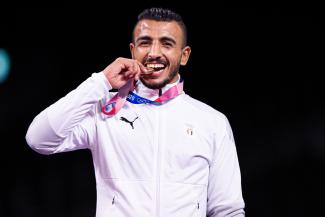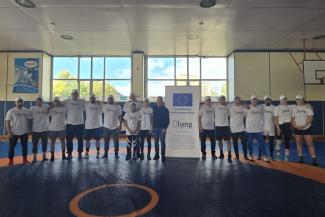'Thank you, wrestling': Tokyo Olympic medalist Elsayed, 27, retires
Monday, July 14, 2025 - 10:34 By Vinay Siwach

EGYPT (July 14) -- Tokyo Olympic bronze medalist Mohamed ELSAYED (EGY) has announced his retirement from wrestling, concluding a distinguished career that included two Olympic appearances and two world U23 gold medals.
Elsayed posted on Instagram about his struggles with injuries and shared that the decision to retire was the "most difficult" for the 27-year-old wrestler.
"After many years of hard work, challenges, and victories [and] after I honored my country and raised its flag in internationally, and was able to achieve my dream and win an Olympic medal in Greco-Roman wrestling, I have reached the most difficult decision in my sports career. I have decided to officially announce my retirement," Elsayed wrote in an emotional post.
Having won five gold medals at the African Championships, Elsayed was a trailblazer in Greco-Roman and was Egypt's new-found hope for the Olympics. He did not disappoint in Tokyo, where he had a surprising run to the semifinal, which he lost to Parviz NASIBOV (UKR), 7-6.
He bounced back in the bronze-medal bout and defeated Artem SURKOV (ROC), 1-1 to capture bronze, Egypt's first medal since 2012 London Olympics and only the third since 1960.
"Wrestling has always been more than just a sport to me," he wrote. "It was my life, my passion, and my support in the most difficult times. I thank God for every moment I lived on the mat and every moment of pride, and every encouragement I heard from my family, fans, and country."
One of the biggest achievements of Elsayed, apart from the Olympic medal, was winning successive world U23 gold medals in 2018 and 2019 at 67kg.
Elsayed expressed gratitude to various individuals who supported him throughout the journey including coaches and trainers. He also thanked wrestling.
"I thank every coach who helped me, every colleague who stood by me, and everyone who supported me with a kind word or a prayer from the heart. Thank you to everyone who was part of the journey.
"Thank you to wrestling, which taught me to be a man before being a champion."


Share your thoughts.
Comments